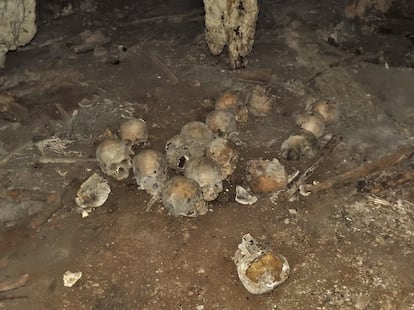From ‘narco-grave’ to ancient archeological treasure: the discovery of 150 skulls in Chiapas sheds light on pre-Hispanic religious customs
Authorities initially thought the site was a crime scene, but anthropologists discovered that it is a ‘tzompantli,’ or altar, from over a millenia ago


When a group of experts from the Chiapas Attorney General’s Office went to a cave in the town of El Carrizal to investigate the discovery of 150 skulls, they initially thought that they had found a narco-grave. The theory was not far-fetched in a country that suffers from brutal drug trafficking-related violence, and where violent deaths and graves of the disappeared are reported every day. The experts from the Attorney General’s Office took the skulls to laboratories in Tuxtla Gutiérrez, the state capital. There, they realized how rare the finding was: the skulls had strange malformations, and none had teeth. They approached experts in anthropology, who determined that the remains are pre-Hispanic bones that were part of a funerary altar, approximately a thousand years old.
“We rescued this material, and it reveals very interesting things,” said Javier Montes de Paz, an anthropologist and researcher at the National Institute of Anthropology and History in Chiapas.
The INAH researchers, led by Montes de Paz, transferred the skulls to the institution’s laboratories to classify and analyze them in depth. Given that similar caves have been found in other communities in Chiapas, they were able to determine that the structures were part of altars, although they have not yet been able to establish why the skulls do not have teeth or why these individuals were beheaded.
They have ascertained that the beheadings occurred between 900 and 1200 A.D. “The studies are not finished and much remains to be done, but what the research has revealed is of great importance. In the analysis we have done, we have identified that the skulls have deformations and none have teeth. It caught our attention, because we think that the teeth were extracted, but we do not know if it was done while they were alive or when they were already dead,” explained Montes de Paz in a video released by the INAH.
For researchers, the discovery of a tzompantli, or altar of the dead, is significant. They have determined this because complete bodies were not present at the side. Although some long bones, including femurs, tibias or radii, were also found, the complete bones are skulls that belong to individuals who were decapitated. They also found remains of wood that could have been used as an altar that held the skulls. Investigators have yet to answer many questions, such as the reason for the altar, why the people were beheaded and why their teeth were removed. “We have very well preserved material and we have given it special physical treatment,” said Montes de Paz.
The researcher criticizes how the experts from the Chiapas Attorney General’s Office managed the remains. The initial handling caused the loss of elements that are significant to determine the historical context of the tzompantli. He affirms, though, that research has turned up information that can shed light on the customs of the populations that inhabited the areas that now make up Chiapas. “We must do a lot of research to get a clearer idea of what this group of individuals was,” said the anthropologist.
Tu suscripción se está usando en otro dispositivo
¿Quieres añadir otro usuario a tu suscripción?
Si continúas leyendo en este dispositivo, no se podrá leer en el otro.
FlechaTu suscripción se está usando en otro dispositivo y solo puedes acceder a EL PAÍS desde un dispositivo a la vez.
Si quieres compartir tu cuenta, cambia tu suscripción a la modalidad Premium, así podrás añadir otro usuario. Cada uno accederá con su propia cuenta de email, lo que os permitirá personalizar vuestra experiencia en EL PAÍS.
¿Tienes una suscripción de empresa? Accede aquí para contratar más cuentas.
En el caso de no saber quién está usando tu cuenta, te recomendamos cambiar tu contraseña aquí.
Si decides continuar compartiendo tu cuenta, este mensaje se mostrará en tu dispositivo y en el de la otra persona que está usando tu cuenta de forma indefinida, afectando a tu experiencia de lectura. Puedes consultar aquí los términos y condiciones de la suscripción digital.








































